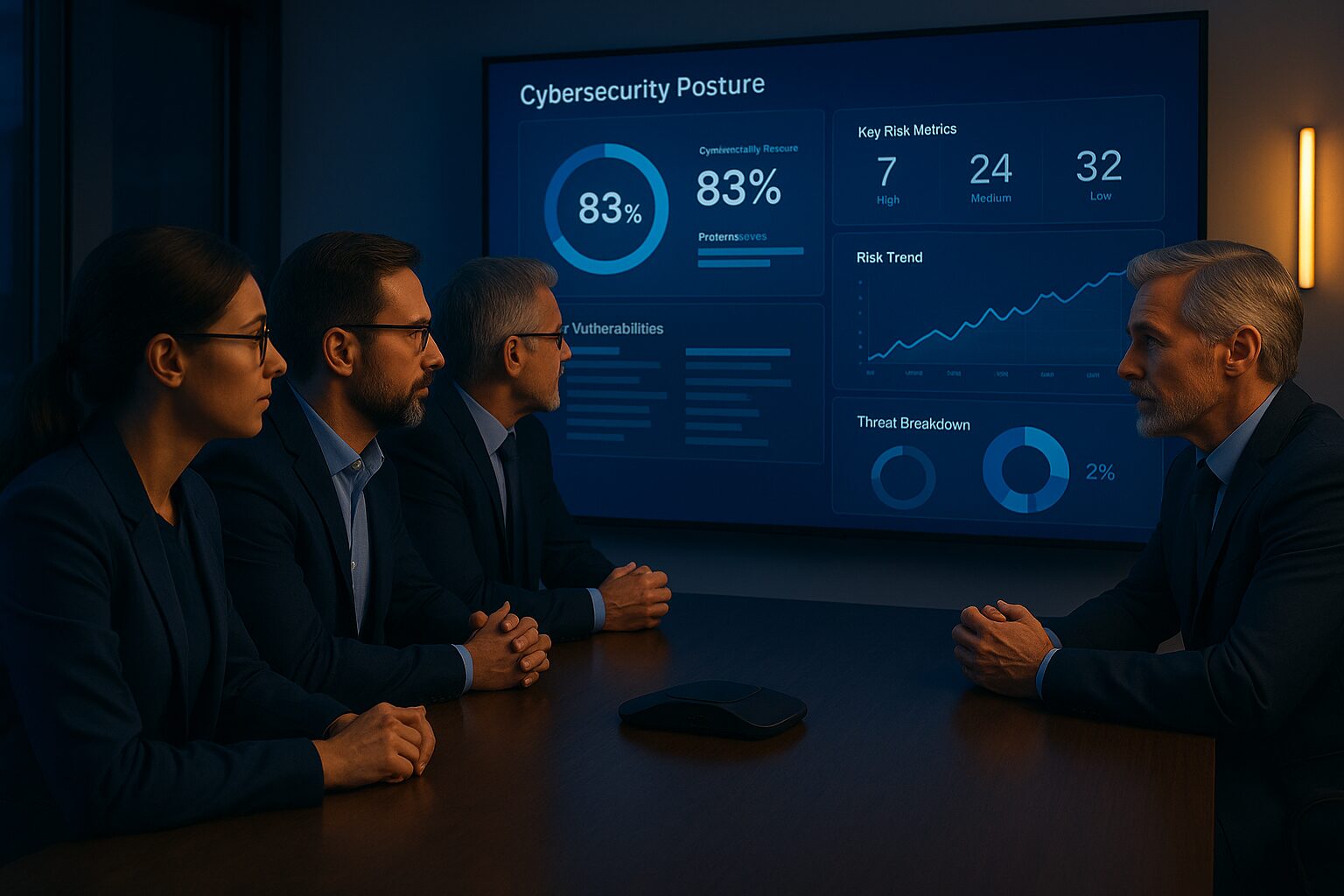Cybersecurity services are no longer optional—they’re essential for protecting your business from a constantly evolving threat landscape.
Attackers are scanning for weak spots around the clock. That might be a missed software update, an untrained employee, or a cloud app that wasn’t configured securely. And for most internal IT teams, staying ahead of those risks is already more than a full-time job.
That’s where cybersecurity service providers come in.
In this article, we’ll break down what cybersecurity companies actually do, the services they provide, and how they help reduce risk, support compliance, and strengthen your organization’s defenses.
Whether you’re just starting your search or reevaluating your current setup, this guide will help you understand what to look for—and what you shouldn’t go without.
Why More Businesses Are Turning to Cybersecurity Services
Many modern businesses conduct a significant portion of their operations online. Even companies with primarily brick-and-mortar locations often store confidential customer and company information in digital formats, whether on internal servers or in the cloud. While the internet has opened new doors for growth—allowing access to a broader customer base and the flexibility to hire remote talent—it has also introduced a constant stream of cyber risks.
Threats such as distributed denial-of-service (DDoS) attacks, viruses, malware, and cybercrime, including the theft of trade secrets and sensitive customer data, are becoming more frequent and sophisticated. As a result, most organizations now recognize the importance of strengthening their cybersecurity posture and are actively working to make their digital operations more secure.
For many, outsourcing cybersecurity services to a third-party provider makes more financial and operational sense than building a fully staffed, in-house security team. Leveraging the expertise of a cybersecurity firm allows internal IT teams to focus on core business needs while ensuring that advanced security functions are handled by specialists.
In the next section, we’ll take a closer look at the different types of cybersecurity services available and how they can help protect your business from today’s most pressing threats.
Risk Assessment Services
Most companies understand that their security posture matters, but many struggle to pinpoint where their actual vulnerabilities lie. Without a clear picture of internal and external threats, it’s nearly impossible to build an effective defense strategy. For organizations in regulated industries or operating in certain geographic regions, the stakes are even higher. Laws like the California Consumer Privacy Act (CCPA), the Health Insurance Portability and Accountability Act (HIPAA), and others require strict data protection measures to safeguard sensitive customer and patient information.
This is where managed security services providers (MSSPs) step in.
MSSPs add value by conducting comprehensive cybersecurity risk assessments that evaluate an organization’s current security landscape. These assessments go beyond surface-level audits. They involve in-depth conversations with leadership, analysis of technical controls, and an evaluation of day-to-day operations that may introduce unnecessary risk. The goal is to identify weaknesses, flag areas of concern, and offer a clear, prioritized roadmap for improvement.
Risk assessments typically examine key areas such as:
- Whether employees receive regular security awareness training, and whether that training is effective and current
- How cybersecurity threats are identified, documented, and escalated within the organization
- The frequency and thoroughness of vulnerability scans across devices, servers, and cloud environments
- Whether there is an incident response plan in place and how well it is understood and followed
- Identification of insider threats or risky behavior that could lead to a breach
- Existing gaps in endpoint protection, access control, or patch management
After gathering this information, the MSSP delivers a risk assessment report that’s written in plain language—not just technical jargon—so both executive teams and IT staff can take action. These reports typically include a combination of quick wins and long-term recommendations that align with business goals and compliance needs.
Beyond serving as a roadmap, a well-executed risk assessment can improve organizational awareness at every level. Executives gain insight into potential liabilities. IT teams get a clearer view of where to focus their time. Even front-line staff can better understand how daily behavior impacts overall risk.
Finally, risk assessments can play a vital role in demonstrating compliance. Whether you’re preparing for an audit or aiming to strengthen your position with insurers or regulators, having a third-party assessment on file shows that your organization takes cybersecurity seriously—and is willing to go beyond minimum requirements to protect its data.
Uncover the Gaps Before Attackers Do
Network Security Monitoring
Network monitoring is critical for companies that want to ensure every part of their infrastructure is running smoothly and securely. It involves keeping a close eye on firewalls, routers, servers, switches, and other components that make up your digital environment. When even one piece underperforms or fails, the ripple effects can impact everything from employee productivity to customer experience.
With real-time monitoring, managed service providers (MSPs) and security operations centers (SOCs) track the health and performance of your systems continuously. This proactive approach allows them to catch small issues before they escalate—such as a misconfigured firewall rule, a failing piece of hardware, or unexpected traffic spikes that could indicate a threat or performance bottleneck.
Beyond just uptime, network monitoring also plays a key role in overall cybersecurity. Unusual patterns in data flow or sudden changes in system behavior can serve as early warnings for breaches or malware infections. A strong monitoring system doesn’t just tell you if your network is online—it helps you understand how it’s performing and whether it’s secure.
For mid-sized businesses with limited internal resources, outsourced network monitoring provides peace of mind. It ensures that your systems are optimized for performance and protected from potential threats, without the need to manage complex tools or staff an around-the-clock internal team.
Endpoint Security Protection and Monitoring
Since vulnerabilities can arise from the devices, phones, tablets, and computers personnel use to conduct business over the network, endpoint detection and response are critical components of a strong network monitoring program. You need to be able to trust that your organization’s IT infrastructure is protected around the clock, making ongoing surveillance critical even during your company’s off-hours. Additionally, with the increasing reliance on a remote workforce that might be logging into a company’s networks from various mobile devices, there is a real risk that viruses and malware might be introduced to the network from endpoint devices. Most cybersecurity companies offer 24/7 network monitoring as well as endpoint protection, including monitoring, detection, and response, so that companies can focus on their core operations without worry.
Software Monitoring and Log Analysis
Software monitoring and log analysis involve reviewing event logs to identify bugs and other cyber risks and to ensure regulatory compliance. These services can also help organizations review the behavior of end users. An event log captures activity within software applications, operating systems, and devices and automatically documents file requests, transfers, log-ins and log-outs, messages, error reports, and other information specified by system administrators. In addition, the event log activity is timestamped, which helps establish a trail for an audit when a data breach, system failure, or another event occurs.
Log analysis could help organizations ensure regulatory compliance with laws that govern how data should be stored and analyzed. It can also provide multiple benefits for an organization, including the following:
- Enhanced troubleshooting by identifying errors and events within the log quickly and pinpointing issues before they happen
- Improved cybersecurity capabilities to identify and contain potential threats and increase response times
- Better customer experience by improving consistency and security while minimizing downtime
Security companies perform software monitoring and log analysis using security solutions that gather and store data from event logs and provide security professionals with a single access point. The logs are typically searchable so that decisions about security, allocation of resources, and the overall health of the network can be made quickly.
The activities performed by a managed services provider might include the following:
- Installation of log collectors to gather data from multiple sources across the organization’s IT infrastructure
- Aggregation of the data at a single location to simplify the process and increase the speed of the analysis
- Comprehensive analysis conducted by leveraging human resources and log analytics to assess known errors, anomalies, and suspicious activity
- Continual monitoring and the issuance of alerts when attention or intervention is needed
- Reporting of events
Let’s Take a Closer Look at Your Security Posture
Security and Advisory Services
Some cybersecurity companies offer security advisory services to help organizations understand the risks involved with data security and systems security. For example, MSSPs can provide advisory services to an organization’s internal IT staff and leadership to identify gaps in the enterprise’s security plans and programs and offer recommendations on how the organization can improve its security posture.
Security advisory services might include the provision of guidance and identification of how an organization’s current security processes deviate from industry-recognized best practices. The MSSP might also recommend a plan for changes the company can make to achieve its security objectives.
Working with your organization, your MSSP can develop both tailored and on-demand security awareness training programs to improve the awareness and education of users about your company’s security policies and their responsibilities and roles to help protect it from cyber threats.
Cybersecurity Solutions
One major benefit of working with managed security services providers that businesses can enjoy is the cybersecurity solutions security companies might offer. Cybersecurity solutions are services and tools that protect companies against cyber attacks that could lead to data breaches, data theft, reputational harm, regulatory violations, downtime, and other serious consequences.
Tools are an essential part of cybersecurity in the modern security environment, with a wide variety of ever-changing threats. As a result, many cybersecurity companies offer robust security solutions for businesses of all sizes, including:
- Next-generation antivirus applications
- Firewall management
- Application security
- Threat intelligence
- Threat detection and prevention
- Endpoint detection and response
- Device control
- SIEM solution
- Malware protection
- Phishing protection
- Incident response
- Internet of Things (IoT) security
- DDoS protection
- Cloud security
- Authentication
- Backup and disaster recovery
- Penetration testing
- Remediation
Organizations can choose tailored solutions to match their needs when they partner with managed security services providers.
Managed Security Services
Managed services an organization outsources might include managed security services that can be conducted in-house or remotely via the cloud. Managed security services providers provide a broad range of services, including security management, establishing infrastructure, threat detection and response, and more. Some companies outsource a portion of their IT security needs to an MSSP, while others fully outsource their information security programs.
Companies might choose to work with managed security services providers for multiple reasons, including the following:
- Not having in-house security resources
- Lack of expertise among their existing IT staff for specific areas of cyber security
- Need to have ongoing security monitoring round-the-clock
- Need for security audits
- Security awareness training
Response to a cyberattack, ransomware attack, or data breach.
Conclusion
Cybersecurity management has become increasingly complex as new threats continuously emerge. It can be difficult for in-house IT staff to keep current with challenges as they arise. As a result, organizations might choose to outsource some or all of their IT security needs to third-party providers to leverage their expertise and the services they provide.
If you would like to learn more about cybersecurity services provided by MSSPs and how they might benefit your organization, contact us for more information.



